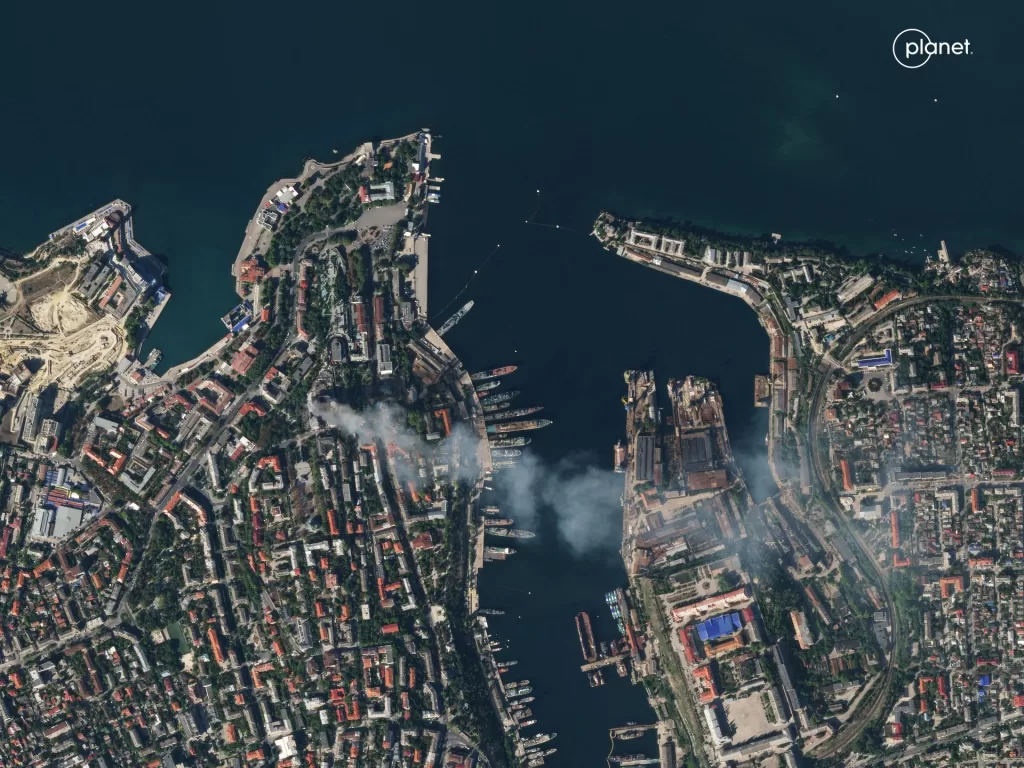“The defence forces of Ukraine successfully hit the Azov and Yamal large landing ships, a communications centre and also several infrastructure facilities of the Russian Black Sea Fleet in temporarily occupied Crimea,” Ukraine’s military said on Sunday.
The military’s statement did not say how it hit the targets, but a Moscow-installed official in the region reported a major Ukrainian air attack, and said air defences had shot down more than 10 missiles over the Crimean port of Sevastopol.
“It was the most massive attack in recent times,” the Russian-appointed governor of Sevastopol, Mikhail Razvozhayev, said in a Telegram post.
He said that a 65-year-old man was killed and four people were injured and that transport infrastructure including passenger boats and buses were partially damaged, with windows broken on five boats.
Three passenger buses, 13 school buses and one trolley bus were among the vehicles damaged, he added.
Footage shared on social media showed a large blast in the city sending a fireball and plume of black smoke into the air, as well as what appeared to be Russian air defences intercepting incoming projectiles.
Ukraine has claimed to have destroyed around a third of Russia’s Black Sea Fleet since Russia invaded Ukraine in February 2022, usually in attacks at night using sea-based drones packed with explosives.
Satellite images show Russia has moved much of the fleet further east, to the port of Novorossiysk, amid the spate of attacks.
Patrick Bury, defence and security analyst at the University of Bath, said the attack would not have a strategic impact on the war.
“Up until a few weeks ago, this would have been really important because the Russians were using those landing crafts to resupply troops down south. But it looks like they have now engineered a railway line, so it won’t have a strategic impact,” Bury told Al Jazeera.
“But by pushing the Black Sea Fleet back further east and out of the Black Sea essentially, it is allowing Ukraine to get more grains exports out which is important to the war economy,” he added.
Increased frequency of Russian attacks
Russia has significantly escalated its air attacks against Ukraine in recent days, in what it says is retaliation for a wave of Ukrainian strikes on its border regions.
In the early hours of Friday, Moscow launched its largest aerial barrages against Ukraine’s energy sector since the start of the war.
Moscow has also resumed targeting the Ukrainian capital Kyiv. On Sunday, Kyiv and the western region of Lviv came under a “massive” Russian air attack, according to Ukrainian officials. They said that while there were no casualties, Russia had fired 29 cruise missiles and 28 drones at its territory overnight.
Russian forces are also seeking to press their advantage in manpower and ammunition as Kyiv faces delays in supplies of additional Western aid.
On Saturday, Moscow claimed to have seized a village on the western outskirts of Bakhmut in eastern Ukraine.
Its capture last month of Adviivka, near the Russian-held stronghold of Donetsk, was the first major territorial gain made by Russia since the devastated city of Bakhmut was seized 10 months ago.
Russian President Vladimir Putin hailed that success as a sign that Russian forces were back on the offensive.
“[Ukraine’s President Volodymyr] Zelenskyy himself said that Russia has won the winter, and I think the momentum has shifted to the Russian forces on the ground at least. Adviivka is proof of that,” Bury said.
“The big question now is whether there is something brewing in probably the month of May once the mud starts to dry in that area of Ukraine. So we will have to wait and see,” he said, adding that the Russians will be doing their absolute best to camouflage any kind of troop build-up if a spring offensive is on the cards.
Russian missile breaches Polish airspace
Meanwhile, Poland’s army said that one of the Russian missiles fired at western Ukraine had entered its airspace.
“Polish airspace was breached by one of the cruise missiles fired in the night by the air forces… of the Russian Federation,” the army posted on X.
“The object flew through Polish airspace above the village of Oserdow [in Lublin province] and stayed for 39 seconds,” it said.
Poland, which has been a staunch ally of its neighbour Ukraine in the two years since the invasion, said on Sunday that it would demand an explanation from Moscow.
